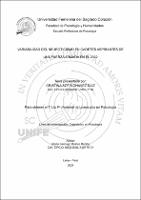| dc.contributor.advisor | Bulnes Bedón, Mario Santiago | |
| dc.contributor.author | Chávez Díaz, Cristina Sofía | |
| dc.date.accessioned | 2024-03-22T20:50:45Z | |
| dc.date.available | 2024-03-22T20:50:45Z | |
| dc.date.issued | 2024 | |
| dc.identifier.uri | http://hdl.handle.net/20.500.11955/1216 | |
| dc.description.abstract | Este estudio buscó identificar si existe variabilidad del neuroticismo y sus facetas en los cadetes aspirantes de una Fuerza Armada en Chorrillos después de su primer año de instrucción militar. La investigación fue de nivel descriptivo con diseño No experimental, descriptivo comparativo y longitudinal. La muestra fue seleccionada de forma no probabilística y estuvo compuesta por 160 cadetes aspirantes varones. En la segunda evaluación participaron 147 cadetes aspirantes. Para la recaudación de datos se utilizó la prueba para la valoración de la aptitud psicológica para postulantes a la Escuela Militar
(PSICAD-EP), la versión adaptada del Inventario de Personalidad NEO Revisado (NEO PI-R). El estudio obtuvo los siguientes resultados: Se comprobó que existen diferencias estadísticamente significativas en el neuroticismo (W = 0.977, p < .001) y las facetas de hostilidad (p = .005), ansiedad social (p = .001) e impulsividad (p = .001). No se encontraron diferencias estadísticamente significativas en las facetas ansiedad (p < .228), depresión (p < .519) y vulnerabilidad (p > .280). Se concluyó que existe
diferencia significativa en el neuroticismo luego del primer año de formación militar donde se manifiesta menos estabilidad y poco autoconocimiento sobre las emociones. Se recomienda incentivar y concientizar a los Oficiales al mando la asistencia al consultorio de psicología, además de realizar talleres
para los cadetes aspirantes donde se les brinden técnicas para el soporte y autocontrol emocional. | es_PE |
| dc.description.abstract | This study aimed to identify whether there is variability in neuroticism and its facets among aspiring cadets of an Armed Force in Chorrillos after their first year of military instruction. The research was descriptive with a longitudinal design. The sample consisted of 160 male aspiring cadets, and the second
evaluation included 147.For data collection, the PSICAD-EP test was used (a test for the assessment of psychological aptitude for applicants to the Chorrillos Military School, which is used in the evaluation process for applicants to the Chorrillos Military School), along with the adapted version of the NEO PI-R
(Revised NEO Personality Inventory) for this population. The study obtained the following results: there is a significant difference in neuroticism with a significance of .000 compared to the p-value of .05 where it does not present a normal distribution, evidencing variability. In the Hostility facet, it shows a
significance of 0.005, in Social Anxiety it shows .001, while in Impulsivity it shows .001. However, no significant difference is found in the Anxiety facets with a significance of .228 compared to the .05 in the p-value, Depression of .519, and Vulnerability of .280 where it shows to maintain a normal distribution.
Therefore, it is suggested that upon finding a significant difference in neuroticism after the first year of military training, there could be less stability and security in emotions. This is a key finding as it could have implications for the emotional well-being of the cadets. It is recommended that further research is conducted to explore this area in more detail. | es_PE |
| dc.description.uri | Tesis | |
| dc.format | application/pdf | es_PE |
| dc.language.iso | spa | es_PE |
| dc.publisher | Universidad Femenina del Sagrado Corazón | es_PE |
| dc.rights | info:eu-repo/semantics/openAccess | es_PE |
| dc.rights.uri | https://creativecommons.org/licenses/by-nc-nd/4.0/ | es_PE |
| dc.source | Repositorio Institucional - UNIFÉ | es_PE |
| dc.subject | Psicología--Tesis | es_PE |
| dc.subject | Neuroticismo | es_PE |
| dc.subject | Militares | es_PE |
| dc.title | Variabilidad del neuroticismo en cadetes aspirantes de una Fuerza Armada en el 2022 | es_PE |
| dc.type | info:eu-repo/semantics/bachelorThesis | es_PE |
| thesis.degree.name | Licenciada en Psicología | es_PE |
| thesis.degree.grantor | Universidad Femenina del Sagrado Corazón. Facultad de Psicología y Humanidades | es_PE |
| thesis.degree.level | Título Profesional | es_PE |
| thesis.degree.discipline | Psicología | es_PE |
| dc.subject.ocde | https://purl.org/pe-repo/ocde/ford#5.01.01 | es_PE |
| renati.advisor.dni | 08258705 | |
| renati.advisor.orcid | https://orcid.org/0000-0001-7126-970X | es_PE |
| renati.author.dni | 72665803 | |
| renati.discipline | 313016 | es_PE |
| renati.juror | Sobrino Chunga, Lisle | es_PE |
| renati.juror | Bulnes Bedón, Mario Santiago | es_PE |
| renati.juror | López Odar, Dennis Rolando | es_PE |
| renati.level | http://purl.org/pe-repo/renati/level#tituloProfesional | es_PE |
| renati.type | http://purl.org/pe-repo/renati/type#tesis | es_PE |
| dc.publisher.country | PE | es_PE |
| dc.description.lineadeinvestigacion | Diagnóstico Psicológico | es_PE |




